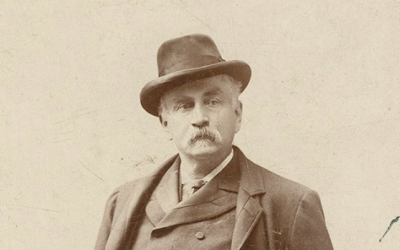With a shortage of farm workers during World War II, Nebraska farmers relied on migrant workers, prisoners of war, and women as substitute labor. Soldiers were also assigned to fill the void, as Elmer Houk, a native of Grosse Pointe, Michigan, stationed in Nebraska, explained to his mother in 1943. Houk volunteered to help farmers around Ulysses, Nebraska. Houk’s hometown newspaper, the Grosse Pointe Review, reproduced the letter that he wrote home for its readers. Today the letter offers proof that home front soldiers were often called upon to do agricultural chores to help the war effort.
“I will try to drop you a line,” Houk wrote to his mother on July 18, 1943, “and tell you why I haven’t written you sooner. Well, here is my excuse. Last Sunday about 10 in the morning, the sarge came into the barracks and asked for fellows who weren’t afraid of work and who would want to help Uncle Sam out in a big way. We asked how. He told us it would be farming. Well, we all jumped at the chance. We went out about 1 p.m. to the railroad station and reached the city from which we would be hired. The farmers greeted us with open arms and were they glad to see us! The man I worked for the first day was named Cobbs. He was a swell person to work for. Sunday was the first night that I spent at his home. He made me so much at home that I didn’t have a chance to be shy.
“They were preparing dinner and he said I just had to eat. I didn’t want to hurt his feelings so I agreed and here is what I sat down to. Mashed potatoes, chicken, Bohemian salad, home made gravy, coffee, milk, home made bread, home made biscuits, home made pie, home made cake, radishes, and home made butter. . . . If I wanted anything and asked for it, you would think I scared the person to death the way they jumped to get it for me. That is how hard up for help the farmers are here. . . . We went out to the fields about 6:30 a.m. and he showed me how to shock oats, that is, his son showed me. His son is 36 years of age and we started to work up and down the rows and I was working hard to keep up with him. I did pretty good. At 1:30 we knocked off for dinner and had steak and everything. It was really a meal. Then we went back to the fields until 7:30 and came in for supper and had another swell meal.
“The next day I was supposed to work for another farmer and Mr. Cobbs really hated to see me go. He took me over to his farm. There I was also greeted with open arms. Everybody was swell. They told me not to work too hard and we worked all day shocking grain and at night I felt good, but boy, was Mr. Vantic tired. He said so himself and he wanted to know why I worked so fast. I told him that I was with Mr. Cobbs’ son and I expected that was the way all farmers worked and that I would be slow if I didn’t do as much as the Cobbs boy did. Then he told me that I had been trying to keep up with the fastest shocker in the county. Boy, was I surprised to hear that. I thought all farmers were that fast but I’ll bet with a year or so of steady shocking I could beat him.
“I worked on this farm for three days and then went over to another farm and there I worked three days. . . . Well, Saturday, when we came back to the barracks, they told us we were on shipping, so I guess before long I will have a new address. Well, Mom, I think I will have to close for now but write soon. Your loving son, Elmer M. Houk”



